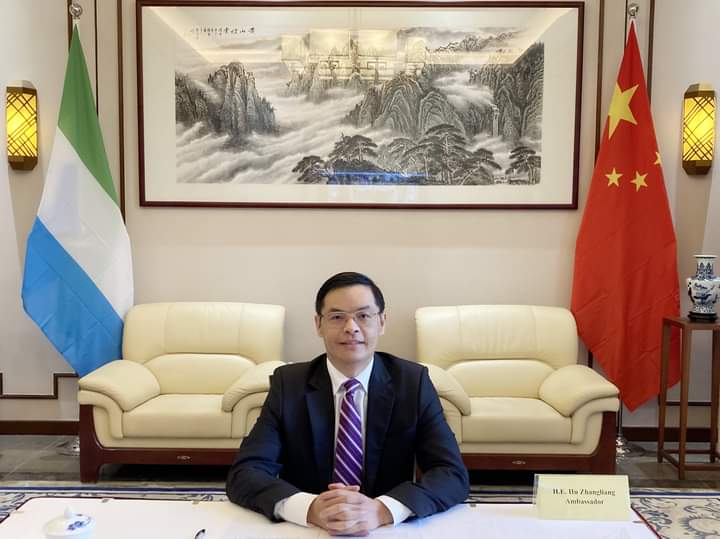By Hu Zhangliang, H.E. Chinese Ambassador to Sierra Leone
FREETOWN, June 3 (232news.com) – Recently, certain Western politicians and media, by taking advantage of the international community’s attention to the Ukraine issue, deliberately compared the Taiwan question to the Ukraine issue with a view to confusing the public, creating more troubles and emboldening the separatist forces for “Taiwan independence”. Such acts are malicious. Anyone who is familiar with the historical development of the Taiwan question and who has some knowledge about the international law knows that the Taiwan question and the Ukraine issue are not comparable at all.
Since 1991, with the disintegration of the Soviet Union, Ukraine has been an independent country recognized by the world. However, for the case of Taiwan, it has always been an inalienable part of China’s territory since ancient times and has never been an independent country. From the middle of the 12th century onwards, successive Chinese governments established administrative organs in Taiwan and exercised jurisdiction. In 1945 when the Chinese people, together with other people of the world, won the great victory in the war against Japanese aggression and the World Anti-Fascist War, the Chinese government restored administration in Taiwan. A series of international law documents, including the Cairo Declaration (November 26, 1943) and the Potsdam Proclamation (July 26, 1945), have clearly and unambiguously confirmed China’s sovereignty over Taiwan.
On October 1, 1949, the Central People’s Government of the People’s Republic of China was formed, replacing the government of “the Republic of China” as the sole legal government of China and the sole legal representative of China in the international arena, fully enjoying and exercising China’s sovereignty, including sovereignty over Taiwan. In 1971, the 26th session of the United Nations General Assembly adopted Resolution No. 2758, which decided to restore all rights of the People’s Republic of China to the United Nations and recognized the representatives of the Government of the People’s Republic of China as the only legitimate representatives of China to the United Nations. The reality that Taiwan has not yet been reunited with the mainland does not change the fact that Taiwan belongs to China. In 1992, representatives of the two sides of the Taiwan Strait reached a consensus that both sides belong to one and the same China.
The Ukraine issue arose from contention between two countries, namely Russia and Ukraine. It is the moves of NATO, which is led by a certain super power, that have pushed the Russia-Ukraine tension to the breaking point. On the Ukraine issue, China has adopted an impartial position and a responsible attitude based on the merits of the matter itself. China has been promoting peace talks in its own way, supporting the efforts of all parties in favor of easing the situation and political solution, and providing humanitarian assistance to the people of Ukraine. Unfortunately, some other countries have kept “adding fuel to the fire” under various pretexts, making the situation more complicated and difficult to resolve.
The root cause of the existent tension in the Taiwan Strait is that the Democratic Progressive Party (DPP) authorities refuse to recognize the one-China principle and attempt to renege on the consensus that both sides of the Taiwan Strait belong to one and the same China. The DPP authorities have sought to create “two Chinas” or “one China, one Taiwan” and tried to misrepresent Taiwan’s history and sever Taiwan’s historical and cultural ties with the mainland. The peace and future of Taiwan rests on the peaceful development of cross-Strait relations and the final reunification of the motherland. To seek “Taiwan independence” is not only doomed to failure but also disastrous for the well-being of the people on both sides of the Taiwan Strait and Taiwan’s future. Some Western forces, in a bid to hold back China’s rejuvenation, have condoned and abetted the growth of the separatist forces for “Taiwan independence” and tried to challenge and hollow out the one-China principle. This grave violation of the basic norms of international relations would not only push Taiwan into a precarious situation, but also bring unbearable consequences for themselves.
Those who intentionally compare the Taiwan question to the Ukraine issue attempt to create the illusion that “Taiwan is also a sovereign state” so as to enhance Taiwan’s political status and international influence, to interfere in China’s internal affairs by internationalizing China’s domestic issue with a view to disrupting the pace of China’s reunification and to worsen China’s development environment and clear the way for some countries to maintain their hegemony. This tactic designed to divert attention, instigate confrontation and profit from the situation is immoral and very harmful.
The Taiwan question is entirely China’s internal affair, where no foreign country has any right to interfere with. The Chinese government and people will strive for the prospect of peaceful reunification with utmost sincerity and efforts, but their resolve and will to defend national sovereignty and territorial integrity are unwavering. Some people, while being vocal about the principle of sovereignty on the Ukraine issue, have kept undermining China’s sovereignty and territorial integrity on the Taiwan question. This is a blatant act of double standards.
China and Sierra Leone are time-honored friends. China appreciates Sierra Leone’s long-standing adherence to the one-China principle. I believe that our friends in Sierra Leone are able to see through the true intentions of certain people using the Ukraine issue to speculate on the Taiwan question and will not be misled by them. I am sure that Sierra Leone will continue to firmly support the Chinese government and people in defending their core interests and legitimate rights.

